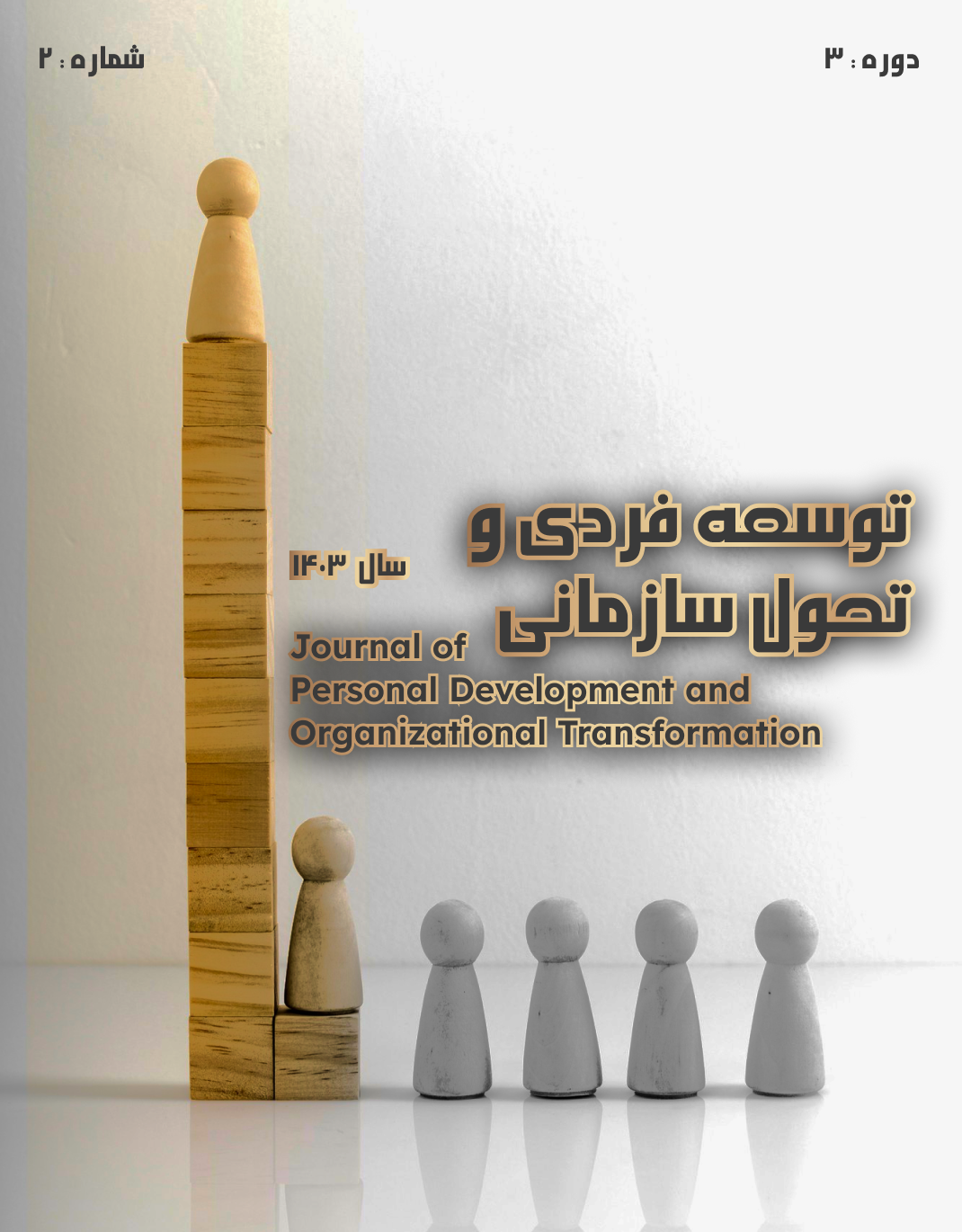Identifying the Antecedents and Consequences of Pluralistic Ignorance in Public Organizations
Keywords:
Pluralistic Ignorance, Normative Groupthink, Conciliatory Groupthink, Passive Groupthink, Government OrganizationsAbstract
The objective of the present study is to design a model of pluralistic ignorance in public organizations. This research was conducted using a qualitative approach and thematic analysis method. The statistical population in the qualitative phase of the study (Delphi stage), aimed at monitoring the components obtained through thematic analysis, consisted of 15 experts and scholars familiar with the fields of behavioral management and human resources in universities and public organizations. In the first phase of this study, the theoretical foundations of pluralistic ignorance were examined. In the second phase, data collection was carried out using a variety of tools and methods, including library research and the use of books, dissertations, and academic journals (covering articles and theses published between 2010 and 2024 Gregorian calendar, and from 1390 to 1403 in the Iranian calendar, available on reputable domestic and international databases). The results indicated that, according to the influence-dependence power map, all variables related to antecedents and consequences exhibit high influence and high susceptibility to influence. Therefore, these are considered linkage variables. Only the variables of the spiral of silence (C1), perceived organizational support vacuum (C12), groupthink (C14), and group identity (C16) demonstrated high dependence and lower influence power, and are thus classified as dependent variables. Ultimately, a model of antecedents and consequences was developed and presented.
Downloads
References
Bilkis Seeme, F. (2020). Agent-Based Modelling of Pluralistic Ignorance in Social Systems A thesis submitted for the degree of Doctor of Philosophy at Monash University in Faculty of Information Technology]. https://bridges.monash.edu/articles/thesis/Agent_Based_Modelling_of_Pluralistic_Ignorance_in_Social_Systems/14714775
Bjerring, J. C., Hansen, J. U., & Pedersen, N. J. L. L. (2014). On the rationality of pluralistic ignorance. Synthese, 191(11), 2445-2470. https://doi.org/10.1007/s11229-014-0434-1
Efthymiopoulos, A. (2024). Organizational Silence and Organizational Commitment: Empirical Evidence From the Greek Public Sector. Journal of Applied Social Science, 18(3), 346-363. https://doi.org/10.1177/19367244241263576
Ersen, N., Usta, U. C., Bayram, B. Ç., & Akyüz, İ. (2023). Intermediate Role of Presenteeism in Relationship Between Organizational Stress and Organizational Silence. Drvna Industrija, 74(2), 183-194. https://doi.org/10.5552/drvind.2023.0046
Fuller, J. K. (2023). An analysis of the social dynamics in boardrooms: Chairperson leadership, pluralistic ignorance and demographic faultlines Master thesis, Philosophy (Accountancy), Queensland University of Technology]. https://eprints.qut.edu.au/240794/
Halbesleben, J. R., Buckley, M. R., & Sauer, N. D. (2004). The role of pluralistic ignorance in perceptions of unethical behavior: An investigation of attorneys' and students' perceptions of ethical behavior. Ethics & Behavior, 14(1), 17-30. https://doi.org/10.1207/s15327019eb1401_2
Halbesleben, J. R. B., Wheeler, A. R., & Buckley, M. R. (2005). Everybody Else is Doing it, So Why Can't We? Pluralistic Ignorance and Business Ethics Education. Journal of Business Ethics, 56, 385-398. https://doi.org/10.1007/s10551-004-3897-z
Jalonen, H. (2023). Ignorance in organisations: a systematic literature review. Management Review Quarterly. https://doi.org/10.1007/s11301-023-00321-z
Kettaf, R. (2024). Investigating the Impact of Organizational Climate on Organizational Silence in Higher Education Institutions. Socioeconomic Challenges, 8(1), 170-182. https://doi.org/10.61093/sec.8(1).170-182.2024
Matsson, A. (2023). How to Organize Silence at work: An Organizational Politics Perspective on Pragmatic Mistreatment at work. Employee Responsibilities and Rights Journal, 1-29. https://doi.org/10.1007/s10672-023-09454-5
Mehdizadeh, I., Rajaeepor, S., & Siadat, S. A. (2023). Organizational Silence and Positive Leadership Strategies: The Mediating Role of Psychological Empowerment. Journal of Public Administration, 15(1), 67-93. https://www.sid.ir/paper/1093221/fa
Mohammadi, M., Hassanpour, A., Jafarinejad, S., & Rangriz, H. (2022). The Impact of Pluralistic Ignorance on Organizational Knowledge Management Based on a Meta-Analytical Approach. Quarterly Journal of Public Policy in Management, 13(47), 257-239. https://civilica.com/doc/1569089/
Munsch, C. L., & O'Connor, L. T. (2018). What I Think You Think about Family and Work: Pluralistic Ignorance and the Ideal Worker Norm (Vol. 13). The Work-Family Interface: Spillover, Complications, and Challenges Contemporary Perspectives in Family Research. https://doi.org/10.1108/S1530-353520180000013019
Munsch, C. L., Ridgeway, C. L., & Williams, J. C. (2014). Pluralistic ignorance and the flexibility bias: Understanding and mitigating flextime and flexplace bias at work. Work and Occupations, 41, 40-62. https://doi.org/10.1177/0730888413515894
Plesner, U., & Justesen, L. (2021). Digitalize and Deny: Pluralistic Collective Ignorance in an Algorithmic Profiling Project. Ephemera: Theory & Politics in Organization, 23(1), 19-48. https://www.cbs.dk/en/research/departments-and-centres/department-of-organization/staff/upioa
Sakr, E. (2023). The Relation Between Organizational Silence and Organizational Learning Among Nurses. Menoufia Nursing Journal, 8(4), 254-270. https://doi.org/10.21608/menj.2023.343403
Sargent, R. H., & Newman, L. S. (2021). Pluralistic Ignorance Research in Psychology: A Scoping Review of Topic and Method Variation and Directions for Future Research. Review of General Psychology, 25(2), 1-22. https://doi.org/10.1177/1089268021995168
Sufi, A. F., Raja, U., & Butt, A. N. (2023). Impact of Peer Unethical Behaviors on Employee Silence: The Role of Organizational Identification and Emotions. Journal of Business Ethics, 1-19. https://doi.org/10.1007/s10551-023-05397-x
Swim, J. K., Gervais, S. J., Pearson, N., & Stangor, C. (2009). Managing the message: Using social influence and attitude change strategies to confront interpersonal discrimination. Cambridge University Press. https://doi.org/10.1017/CBO9780511804465.004
Taheri, F. (2019). Examining Pluralistic Ignorance in Organizations: Antecedents and Consequences. Quarterly Journal of Organizational Behavior Studies, 8(2), 150-125. https://www.sid.ir/paper/245473/fa
Yazdani, F., Noori, H., & Khalaf, M. (2024). The relationship between organizational trust and organizational resilience with the perception of organizational silence among secondary school art teachers in Karbala. Educational Leadership Research, 8(29), 114-192. https://jrlat.atu.ac.ir/article_17265.html?lang=en
Zhang, W. (2024). Regulatory Focus as a Mediator in the Relationship Between Nurses' Organizational Silence and Professional Identity. Journal of Advanced Nursing, 80(9), 3625-3636. https://doi.org/10.1111/jan.16113
Downloads
Published
Submitted
Revised
Accepted
Issue
Section
License
Copyright (c) 2025 فاطمه نبی زاده شهربابکی (نویسنده); حمید تابلی; ملیکه بهشتی فر (نویسنده)

This work is licensed under a Creative Commons Attribution-NonCommercial 4.0 International License.







